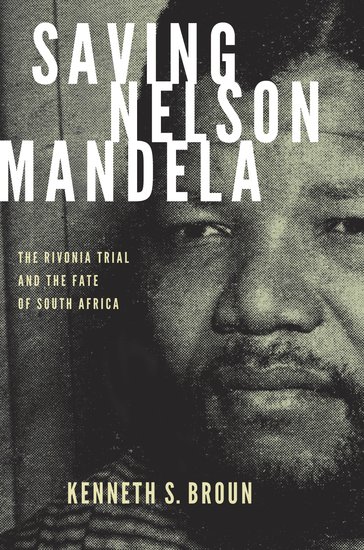By Kenneth S. Broun
This October 25th marks the fiftieth anniversary of the beginning of Nelson Mandela’s twenty-seven years in South African prisons. He was initially sentenced in October, 1962 to five years imprisonment for inciting African workers to strike and for leaving the country without valid travel documents. Immediately after sentencing, he was sent to the Robben Island prison, lying off Cape Town harbor, where he was held in solitary confinement. He was brought back to Pretoria, the South African administrative capital, less than a year later to face even more serious charges under the Sabotage Act — charges that could have resulted in a death sentence. Those subsequent charges culminated in the Rivonia trial — a trial that was to last from October, 1963 until June, 1964 and constitute one of the most dramatic political trials in world history. The Rivonia trial resulted in a life sentence.
Although perhaps historically dwarfed by Rivonia, the 1962 trial was itself a significant moment in South African history and in the formation of the man, Nelson Mandela, and his legend. The trial was held in a building that had been converted from an old synagogue to a court. Mandela, although he had been advised by two skilled and experienced criminal defense lawyers, Harold Wolpe and Joe Slovo, elected to represent himself. He was an experienced lawyer and his initial act was to seek to recuse the magistrate who was to try the case. In his application for recusal, Mandela respectfully stated that there was nothing personal in his motion. Rather, he objected that he would not be given a fair and proper trial by a white judicial officer, “however high his esteem and however strong his sense of fairness and justice.” Whites had denied black Africans the right of representation in Parliament. He added, “it is improper and against the elementary principles of justice to entrust whites with cases involving the denial by them of basic human rights to the African people.”
The magistrate summarily denied Mandela’s application for recusal. Mandela pled not guilty and the State presented its case. Mandela was an active cross-examiner but offered no evidence in his own defense. Not surprisingly, he was found guilty. He was permitted to make a statement in mitigation of sentence. The statement outlined the history of the struggle of African people and his own involvement in that struggle. He concluded:
Whatever sentence Your Worship sees fit to impose upon me for the crime for which I have been convicted before this court, may it rest assured that when my sentence has been completed, I will still be moved, as men are always moved, by their consciences. I will still be moved by my dislike of the race discrimination against my people when I come out from serving my sentence to take up again, as best I can the struggle for the removal of those injustices until they are finally abolished once and for all.
Almost two years later, when facing the possibility of a death sentence at the Rivonia trial, he concluded with a similar statement, although under the circumstances, in a more dramatic tone:
During my lifetime I have dedicated myself to this struggle of the African people. I have fought against white domination and I have fought against black domination. I have cherished the ideal of a democratic and free society… It is an ideal which I hope to live for and to achieve. But if need be it is an ideal for which I am prepared to die.
Mandela’s words from the Rivonia trial are now enshrined on the wall of the Constitutional Court building in Johannesburg.
Nelson Mandela did not die either by hanging or in a South African prison. He survived the full legal onslaught of the apartheid State. He was convicted both in 1962 and at the Rivonia trial in 1964. But on both occasions he maintained his dignity and resisted, as best he could under the circumstances, the legal cases against him. And in both trials, he successfully made his case for the struggle against an oppressive regime and against racism all over the world.
Nelson Mandela’s brilliance at these two trials would have been historically important even if he had not survived to lead his country to a new constitutional democracy. His articulation of the case for his cause would serve as inspiration for his people and for all people fighting oppression. But just as importantly, his contribution to his own survival insured that this great man would be alive to provide the leadership necessary for South Africa to go beyond its oppressive past.
His imprisonment, which began 50 years ago, would last for twenty-seven years. The leadership that he gave his people, in the courtroom, in prison and after his release, will last for the ages.
Kenneth S. Broun is the Henry Brandis Professor of Law at the University of North Carolina Law School. Since 1986, he has traveled regularly to South Africa to conduct programs in trial advocacy training through the Black Lawyers Association of South Africa. He is the author of Saving Nelson Mandela: The Rivonia Trial and the Fate of South Africa. Read his previous blog post: “Nelson Mandela, 22 years after his release from prison.”
Subscribe to the OUPblog via email or RSS.
Subscribe to only law and politics articles on the OUPblog via email or RSS.
Subscribe to only African history articles on the OUPblog via email or RSS.
View more about this book on the ![]()
![]()
Image credit: 6th April 2000 Visit of Nelson Mandela to give a lecture at LSE on ‘Africa and Its Position in the World.’ Held at the Peacock Theatre. London School of Economics.




The leadership and courage Nelson Mandela showed was just amazing. I can defenetly see why both his name and his story will go down in history.